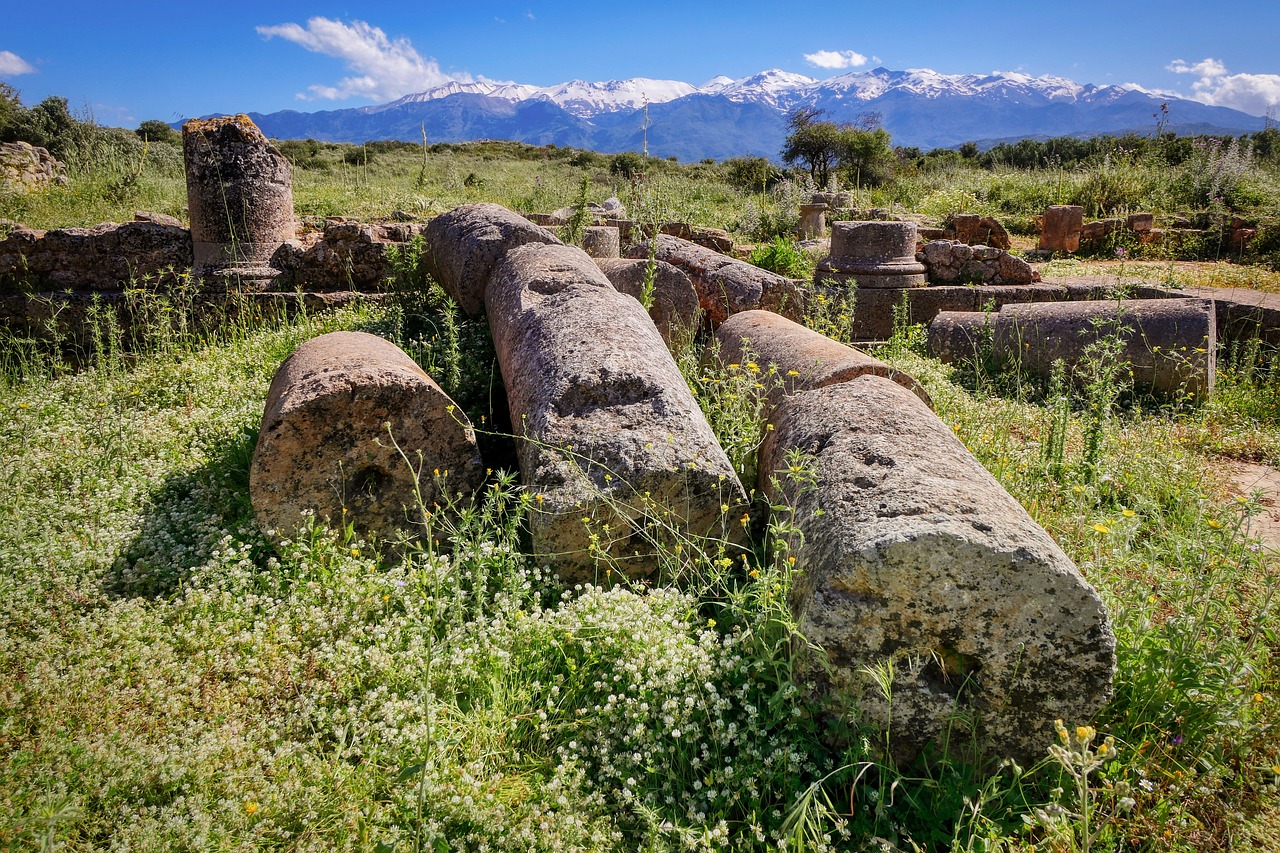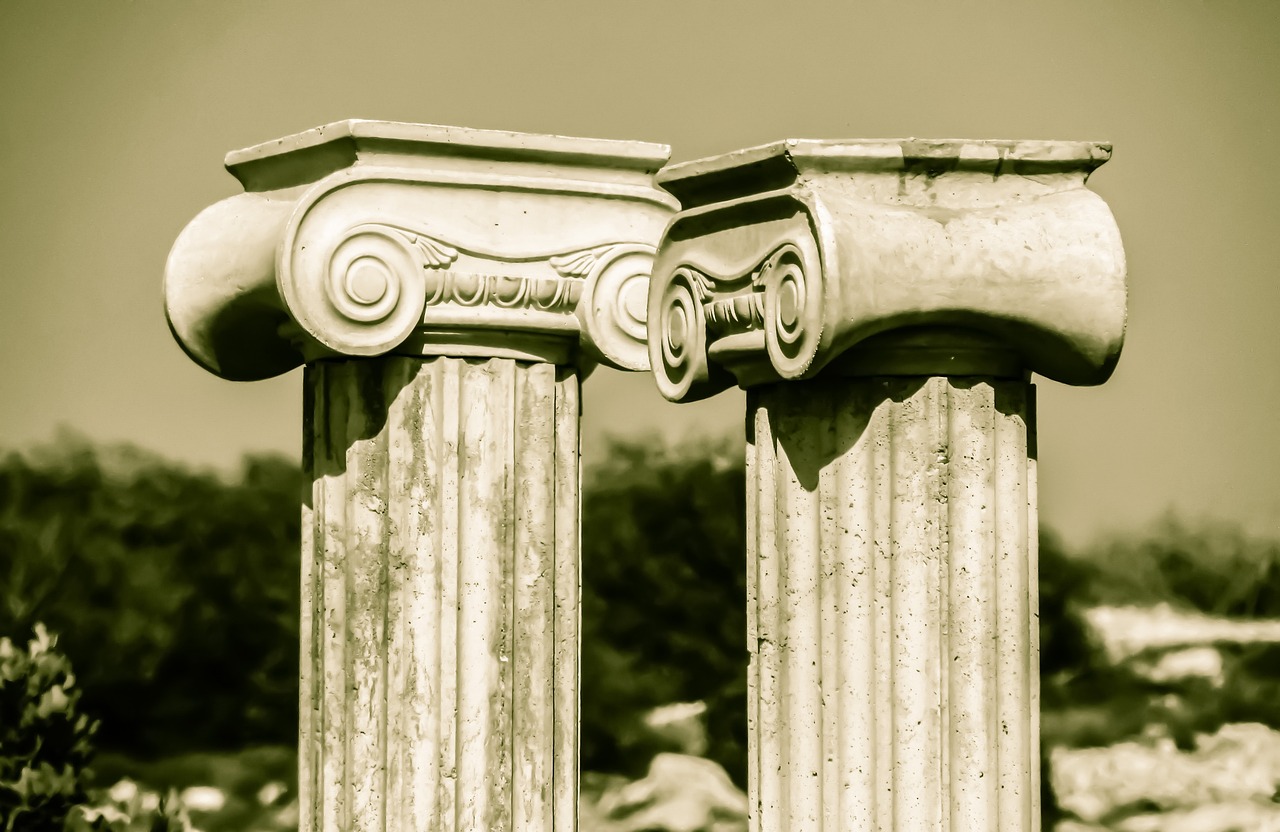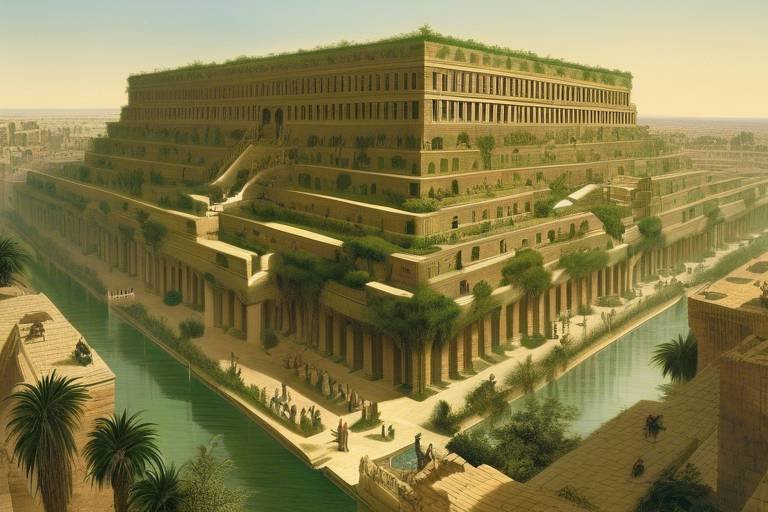The Mystery of the Ancient Greeks' Influence on Modern Science
The ancient Greeks have left an indelible mark on the landscape of modern science, their influence reverberating through the corridors of time to shape the very foundations of our understanding of the natural world. From the pioneering philosophical inquiries of thinkers like Thales, Anaximander, and Pythagoras to the mathematical brilliance of Euclid, Pythagoras, and Archimedes, the legacy of ancient Greek science is a tapestry woven with threads of reason, observation, and intellectual curiosity.
Aristotle, with his systematic approach to scientific inquiry and emphasis on empirical observation and logical reasoning, laid the groundwork for the development of modern scientific methodologies. His teachings continue to echo through the halls of academia, guiding contemporary scientists in their quest for knowledge and understanding.
The Hellenistic period witnessed a flourishing of scientific advancements in fields such as astronomy, medicine, and engineering, with figures like Hipparchus, Galen, and Hero pushing the boundaries of human knowledge. Their discoveries paved the way for future generations of scientists to explore the mysteries of the universe and harness the power of technology for the betterment of society.
The transmission of Greek knowledge to the Islamic world played a crucial role in preserving and expanding upon the scientific achievements of the ancient Greeks. Islamic scholars served as custodians of this precious heritage, translating Greek texts into Arabic and disseminating this wisdom to the wider world, laying the groundwork for the scientific renaissance that would follow.
During the Renaissance, a renewed interest in Greek scientific texts sparked a revolution in European thought, with luminaries like Leonardo da Vinci and Copernicus drawing inspiration from the works of their ancient predecessors. The rediscovery of ancient Greek knowledge fueled a wave of scientific innovation that would forever alter the course of human history.
Today, as we stand on the shoulders of giants like Thales, Euclid, and Aristotle, we owe a debt of gratitude to the ancient Greeks for their profound contributions to the advancement of human knowledge. Their insights into the workings of the natural world continue to inform and inspire modern scientific inquiry, serving as a testament to the enduring relevance of Greek thought in the pursuit of truth and understanding.
While the legacy of ancient Greek science is undeniable, it is not without its challenges and criticisms. Debates persist regarding the appropriation of Greek scientific ideas in the modern era, with scholars grappling with the limitations and biases inherent in interpreting and applying ancient principles to contemporary contexts. Despite these complexities, the enduring legacy of the ancient Greeks' influence on modern science remains a testament to the power of human curiosity and the enduring quest for knowledge.

Ancient Greek Philosophers and Natural Science
Topics to be discussed in the article include the remarkable contributions of ancient Greek thinkers to modern scientific principles and methodologies, highlighting the enduring legacy and impact of their intellectual pursuits on contemporary scientific advancements.
Ancient Greek philosophers such as Thales, Anaximander, and Pythagoras played a pivotal role in shaping the foundations of modern scientific inquiry. By proposing naturalistic explanations for various phenomena, these early thinkers emphasized the importance of reason and observation in understanding the world around us.
Thales, often regarded as the first philosopher of the Western tradition, sought to explain natural phenomena without resorting to mythical or supernatural narratives. Anaximander introduced the concept of the "apeiron," an indefinite substance from which all things originate, laying the groundwork for theories of cosmology and natural laws.
Pythagoras, known for his contributions to mathematics, believed in the harmony of the universe and the mathematical relationships underlying all aspects of reality. His mathematical discoveries not only influenced the development of geometry but also paved the way for modern scientific advancements in fields such as physics and astronomy.
These ancient Greek philosophers set the stage for a more systematic and rational approach to understanding the natural world, a legacy that continues to resonate in modern scientific practices.
Investigating the significant mathematical discoveries of ancient Greeks like Euclid, Pythagoras, and Archimedes, and how their theorems and principles continue to underpin various branches of contemporary mathematics and science.
Examining Aristotle's systematic approach to scientific inquiry, his emphasis on empirical observation and logical reasoning, and the enduring impact of his methodologies on the development of modern scientific methods and theories.
Delving into the advancements in fields such as astronomy, medicine, and engineering during the Hellenistic period, and how the works of scientists like Hipparchus, Galen, and Hero have shaped modern scientific disciplines.
Exploring the pivotal role played by Islamic scholars in preserving and expanding upon Greek scientific knowledge, and how the translation of Greek texts into Arabic facilitated the transmission of ancient wisdom to the Western world.
Discussing the revival of interest in Greek scientific texts during the Renaissance, and how the rediscovery of ancient Greek works by figures like Leonardo da Vinci and Copernicus fueled the scientific revolution in Europe.
Analyzing the direct and indirect influences of ancient Greek scientific thought on contemporary scientific disciplines, from physics and biology to astronomy and mathematics, highlighting the enduring relevance of Greek contributions to modern science.
Examining the debates and criticisms surrounding the appropriation of Greek scientific ideas in the modern era, and addressing the limitations and biases inherent in interpreting and applying ancient Greek scientific principles in contemporary contexts.
Stay tuned for some frequently asked questions about the ancient Greeks' influence on modern science!

Greek Mathematics and its Modern Applications
Topics to be discussed in the article include the remarkable contributions of ancient Greek thinkers to modern scientific principles and methodologies, highlighting the enduring legacy and impact of their intellectual pursuits on contemporary scientific advancements.
Ancient Greek mathematicians, such as Euclid, Pythagoras, and Archimedes, made groundbreaking discoveries that continue to shape modern mathematics and science. Euclid's "Elements" laid the foundation for geometry, while Pythagoras' theorem is fundamental in trigonometry and physics. Archimedes' contributions to calculus and physics are still studied today, demonstrating the timelessness of Greek mathematical principles.

Aristotle's Influence on Modern Scientific Methodology
Topics to be discussed in the article include the remarkable contributions of ancient Greek thinkers to modern scientific principles and methodologies, highlighting the enduring legacy and impact of their intellectual pursuits on contemporary scientific advancements.
Exploring how early Greek philosophers such as Thales, Anaximander, and Pythagoras laid the foundation for modern scientific inquiry by proposing naturalistic explanations for phenomena and emphasizing the role of reason and observation.
Investigating the significant mathematical discoveries of ancient Greeks like Euclid, Pythagoras, and Archimedes, and how their theorems and principles continue to underpin various branches of contemporary mathematics and science.
Examining Aristotle's systematic approach to scientific inquiry, his emphasis on empirical observation and logical reasoning, and the enduring impact of his methodologies on the development of modern scientific methods and theories.
Delving into the advancements in fields such as astronomy, medicine, and engineering during the Hellenistic period, and how the works of scientists like Hipparchus, Galen, and Hero have shaped modern scientific disciplines.
Exploring the pivotal role played by Islamic scholars in preserving and expanding upon Greek scientific knowledge, and how the translation of Greek texts into Arabic facilitated the transmission of ancient wisdom to the Western world.
Discussing the revival of interest in Greek scientific texts during the Renaissance, and how the rediscovery of ancient Greek works by figures like Leonardo da Vinci and Copernicus fueled the scientific revolution in Europe.
Analyzing the direct and indirect influences of ancient Greek scientific thought on contemporary scientific disciplines, from physics and biology to astronomy and mathematics, highlighting the enduring relevance of Greek contributions to modern science.
Examining the debates and criticisms surrounding the appropriation of Greek scientific ideas in the modern era, and addressing the limitations and biases inherent in interpreting and applying ancient Greek scientific principles in contemporary contexts.
Q: How did ancient Greek philosophy influence modern scientific methods?
A: Ancient Greek philosophers laid the groundwork for modern scientific inquiry by emphasizing reason, observation, and naturalistic explanations, which are fundamental to scientific methodologies today.
Q: What role did Aristotle play in the development of modern science?
A: Aristotle's systematic approach to scientific inquiry, focus on empirical observation, and logical reasoning greatly influenced the evolution of modern scientific methodologies and theories.
Q: Why is the transmission of Greek knowledge to the Islamic world significant?
A: The translation of Greek texts into Arabic by Islamic scholars played a crucial role in preserving and expanding upon ancient Greek scientific knowledge, ultimately contributing to the development of Western science.
Q: How did the Renaissance impact the revival of Greek science?
A: During the Renaissance, the rediscovery of ancient Greek scientific works sparked a renewed interest in science, leading to significant advancements and laying the foundation for the scientific revolution in Europe.
Q: What challenges exist in applying ancient Greek scientific principles in modern contexts?
A: There are debates and criticisms regarding the appropriation of Greek scientific ideas today, as interpreting and applying ancient principles in contemporary science can be limited by cultural biases and technological advancements.

Hellenistic Science and its Legacy
During the Hellenistic period, a time marked by the expansion of Greek influence following the conquests of Alexander the Great, significant advancements were made in various scientific fields that would leave a lasting legacy on the development of modern science. The Hellenistic era saw remarkable progress in disciplines such as astronomy, medicine, and engineering, with scholars like Hipparchus, Galen, and Hero making notable contributions that would shape the course of scientific inquiry for centuries to come.
Hipparchus, often regarded as the father of trigonometry, revolutionized the field of astronomy with his precise observations and mathematical calculations. His work laid the groundwork for future astronomers and navigators, influencing the development of celestial mapping and the understanding of planetary motion.
Galen, a pioneering physician whose medical theories dominated Western medicine for over a millennium, made significant advancements in anatomy, physiology, and pharmacology during the Hellenistic period. His meticulous studies and writings on the human body and medical practices formed the basis of modern medical science and clinical practice.
Hero of Alexandria, an ingenious engineer and inventor, contributed to the fields of mechanics and hydraulics with his innovative designs and technological creations. His inventions, such as the aeolipile and the first known vending machine, showcased the practical applications of scientific principles and laid the groundwork for future technological advancements.
The legacy of Hellenistic science extends beyond the achievements of individual scholars, encompassing a broader cultural and intellectual movement that emphasized empirical observation, experimentation, and the pursuit of knowledge for its own sake. The works of Hellenistic scientists not only advanced scientific understanding in their time but also inspired future generations of thinkers and innovators to push the boundaries of human knowledge and exploration.

The Transmission of Greek Knowledge to the Islamic World
During the Golden Age of Islam, the transmission of Greek knowledge to the Islamic world played a pivotal role in shaping the development of science and philosophy. Islamic scholars eagerly embraced the works of ancient Greek thinkers, recognizing the value and wisdom contained within texts on mathematics, astronomy, medicine, and philosophy.
One of the key figures in this transmission was the renowned scholar Al-Kindi, known as the "Philosopher of the Arabs." Al-Kindi, along with other translators and scholars, worked diligently to translate Greek texts into Arabic, ensuring that the knowledge of the ancient Greeks would not be lost to history.
These translated works, including the writings of Aristotle, Plato, and Ptolemy, became foundational texts in the Islamic world, sparking a period of intense intellectual activity and innovation. Islamic scholars built upon the ideas of their Greek predecessors, expanding upon them and making significant advancements in various scientific disciplines.
The House of Wisdom in Baghdad emerged as a center of learning and scholarship, where scholars from diverse backgrounds gathered to study and exchange ideas. This vibrant intellectual environment facilitated the synthesis of Greek, Persian, Indian, and Arabic knowledge, leading to groundbreaking discoveries and innovations.
Through the efforts of these scholars, Greek knowledge was not only preserved but also enriched and expanded upon, laying the groundwork for the flourishing of science and philosophy in the Islamic world. The transmission of Greek knowledge to the Islamic world was a transformative process that contributed significantly to the advancement of human understanding and paved the way for future scientific developments.

The Renaissance Revival of Greek Science
During the Renaissance, a period marked by a fervent revival of interest in art, literature, and science, the works of ancient Greek thinkers experienced a renaissance of their own. The resurgence of Greek scientific texts, including those of Aristotle, Euclid, and Archimedes, played a pivotal role in shaping the intellectual landscape of Europe and fueling the scientific revolution that would follow.
Figures like Leonardo da Vinci and Copernicus delved into the ancient Greek works, drawing inspiration and insights that would challenge prevailing beliefs and pave the way for groundbreaking discoveries. The rediscovery of Greek science during the Renaissance not only reignited curiosity and exploration but also laid the foundation for the modern scientific methodologies and principles that continue to guide scientific inquiry today.

Modern Science's Debt to Ancient Greek Thought
Modern science owes a profound debt to the intellectual giants of ancient Greece, whose groundbreaking ideas and methodologies laid the foundation for contemporary scientific disciplines. The legacy of ancient Greek thought permeates various branches of modern science, influencing everything from the fundamental principles of physics to the intricate workings of biological systems.
Ancient Greek philosophers such as Thales, Anaximander, and Pythagoras introduced the concept of naturalistic explanations for natural phenomena, emphasizing the importance of reason and observation in understanding the world around us. Their philosophical inquiries set the stage for the empirical approach that defines modern scientific investigation.
One of the most significant contributions of ancient Greek mathematics to modern science is the enduring legacy of figures like Euclid, Pythagoras, and Archimedes. Their mathematical theorems and principles continue to underpin various branches of contemporary mathematics and science, serving as the building blocks for complex scientific theories and calculations.
Furthermore, Aristotle's systematic approach to scientific inquiry, which emphasized empirical observation and logical reasoning, has had a lasting impact on the development of modern scientific methodologies. His emphasis on the importance of systematic observation and classification laid the groundwork for the scientific method as we know it today.
During the Hellenistic period, advancements in fields such as astronomy, medicine, and engineering further enriched the legacy of Greek science. Figures like Hipparchus, Galen, and Hero made significant contributions to these disciplines, shaping the trajectory of modern scientific thought and practice.
The transmission of Greek knowledge to the Islamic world played a pivotal role in preserving and expanding upon ancient Greek scientific ideas. Islamic scholars translated Greek texts into Arabic, facilitating the dissemination of ancient wisdom to the Western world and contributing to the flourishing of scientific knowledge during the Middle Ages.
The Renaissance witnessed a revival of interest in Greek scientific texts, with figures like Leonardo da Vinci and Copernicus rediscovering and building upon ancient Greek works. This resurgence of Greek thought fueled the scientific revolution in Europe, leading to groundbreaking discoveries and advancements in various scientific fields.
Today, the influence of ancient Greek thought on modern science is undeniable. The direct and indirect impacts of Greek scientific principles can be seen across disciplines such as physics, biology, astronomy, and mathematics, underscoring the enduring relevance and significance of Greek contributions to the advancement of human knowledge.
While the Greek scientific legacy continues to inspire and inform contemporary scientific inquiry, it is not without its challenges and criticisms. Debates surrounding the appropriation of ancient Greek ideas in the modern era raise questions about the limitations and biases inherent in interpreting and applying historical scientific principles in today's scientific landscape.

Challenges and Criticisms of the Greek Scientific Legacy
When exploring the enduring legacy of ancient Greek scientific thought, it is essential to acknowledge the challenges and criticisms that arise in interpreting and applying these age-old principles to modern scientific contexts. While the contributions of Greek philosophers and scientists have undeniably shaped the foundations of contemporary science, there are complexities and limitations that come with integrating ancient ideas into present-day research methodologies.
One of the primary challenges facing the Greek scientific legacy is the issue of cultural and historical context. The philosophical and scientific frameworks developed by ancient Greek thinkers were rooted in the societal norms, beliefs, and technological constraints of their time. As such, applying these frameworks directly to modern scientific inquiries can lead to oversimplification or misinterpretation of complex phenomena.
Furthermore, critics argue that the emphasis on reason and logic in Greek scientific thought may not always align with the empirical and experimental methodologies prevalent in contemporary science. While the deductive reasoning employed by figures like Aristotle was groundbreaking in its time, some modern scientists question the applicability of purely theoretical approaches to the complexities of today's scientific challenges.
Another point of contention lies in the selective interpretation of Greek scientific texts and ideas. As these ancient works have been translated, interpreted, and reinterpreted over centuries, there is a risk of cherry-picking concepts that align with preconceived notions or agendas, leading to a distortion of the original intent and meaning behind the Greek scientific legacy.
Moreover, the Eurocentric bias inherent in the glorification of Greek scientific achievements has been a subject of criticism. While the contributions of ancient Greek thinkers are undoubtedly significant, there is a danger in overlooking the scientific advancements made by other cultures and civilizations throughout history. By elevating Greek science to a pedestal, there is a risk of marginalizing the diverse and valuable scientific traditions of non-Western societies.
In navigating the challenges and criticisms surrounding the Greek scientific legacy, it is crucial for modern scientists and scholars to approach ancient ideas with a critical and discerning eye. By acknowledging the limitations and biases inherent in interpreting historical scientific thought, researchers can engage in a more nuanced and inclusive dialogue that honors the complexities of scientific progress across cultures and time periods.
Frequently Asked Questions
- What were some key contributions of ancient Greek thinkers to modern science?
Ancient Greek thinkers made significant contributions to modern science by laying the foundation for scientific inquiry, emphasizing reason and observation, and developing methodologies that continue to influence contemporary scientific advancements.
- Which ancient Greek philosophers were instrumental in shaping modern scientific principles?
Philosophers such as Thales, Anaximander, Pythagoras, and Aristotle played crucial roles in shaping modern scientific principles through their naturalistic explanations, emphasis on empirical observation, and systematic approaches to scientific inquiry.
- How did the transmission of Greek knowledge to the Islamic world impact modern science?
The transmission of Greek knowledge to the Islamic world led to the preservation and expansion of scientific ideas, fostering a rich intellectual exchange that influenced the development of modern scientific disciplines and methodologies.
- What challenges and criticisms exist regarding the Greek scientific legacy in modern times?
Debates and criticisms surrounding the Greek scientific legacy in modern times revolve around issues of interpretation, appropriation, and the application of ancient Greek scientific ideas to contemporary contexts, highlighting the complexities and limitations of integrating historical knowledge into present-day scientific practices.



















